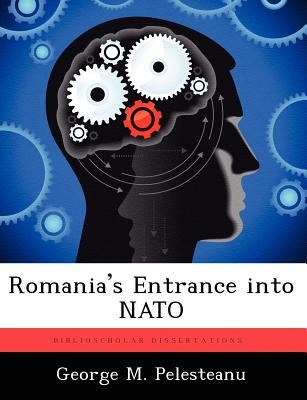
- We will send in 10–14 business days.
- Author: George M Pelesteanu
- Publisher: BiblioScholar
- ISBN-10: 1249286409
- ISBN-13: 9781249286400
- Format: 18.9 x 24.6 x 0.8 cm, softcover
- Language: English
- SAVE -10% with code: EXTRA
Reviews
Description
The end of the Cold War and the significant social and political changes from the central and eastern European countries created a great opportunity for an improved security environment in the whole of the Euro-Atlantic area. Initiated in response to the new security architecture, the 1995 Study on NATO Enlargement established the principles and conditions to be accomplished by candidate states in order to become a full member of the alliance. With Romania as case in point, this thesis uses a comparative method for analysis of the extent at which candidate states from the 2004 wave of enlargement were prepared for NATO integration. The accomplishment of entrance conditions was then compared with candidates' strategic attractiveness in order to establish which of these rationales weighted more in the balance for Romania's entrance into NATO. The analysis of historical issues and reasons that determined Romania to seek for NATO acceptance constituted the foundation of the attempt to answer the primary question: Did NATO accept Romania as a full member based on accomplishment of entrance preconditions or on strategic rationale? The results of the evaluation process revealed that other aspects, such as political implications, have to be taken into consideration for the analysis of an aspirant state for NATO membership.
EXTRA 10 % discount with code: EXTRA
The promotion ends in 18d.08:21:27
The discount code is valid when purchasing from 10 €. Discounts do not stack.
- Author: George M Pelesteanu
- Publisher: BiblioScholar
- ISBN-10: 1249286409
- ISBN-13: 9781249286400
- Format: 18.9 x 24.6 x 0.8 cm, softcover
- Language: English English
The end of the Cold War and the significant social and political changes from the central and eastern European countries created a great opportunity for an improved security environment in the whole of the Euro-Atlantic area. Initiated in response to the new security architecture, the 1995 Study on NATO Enlargement established the principles and conditions to be accomplished by candidate states in order to become a full member of the alliance. With Romania as case in point, this thesis uses a comparative method for analysis of the extent at which candidate states from the 2004 wave of enlargement were prepared for NATO integration. The accomplishment of entrance conditions was then compared with candidates' strategic attractiveness in order to establish which of these rationales weighted more in the balance for Romania's entrance into NATO. The analysis of historical issues and reasons that determined Romania to seek for NATO acceptance constituted the foundation of the attempt to answer the primary question: Did NATO accept Romania as a full member based on accomplishment of entrance preconditions or on strategic rationale? The results of the evaluation process revealed that other aspects, such as political implications, have to be taken into consideration for the analysis of an aspirant state for NATO membership.


Reviews